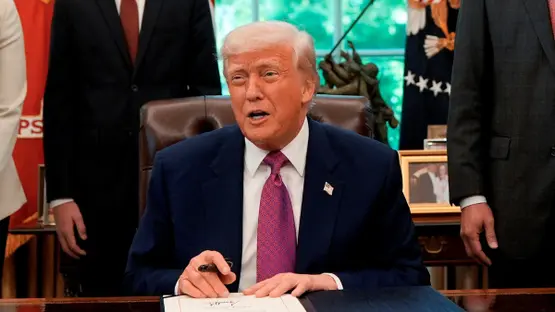Trump Announces Sanctions Lift on Syria in Riyadh, Urges Support for New Government
By Kardo Roj
RIYADH, Saudi Arabia (North Press) – U.S. President Donald Trump announced on Tuesday that he will lift sanctions imposed on Syria, offering what he described as “a new opportunity” for the Syrian government to restore stability and peace in the war-torn country. The declaration came during his speech at the Saudi-U.S. Investment Forum in Riyadh, where Trump is on a high-profile regional tour.
“Syria has seen much suffering and death. Now, it has a new government, and we must all hope it can bring peace and stability to its people,” Trump said during the event, held in the Saudi capital.
The announcement marks a dramatic shift in U.S. policy toward Syria, where years of civil war, foreign intervention, and political fragmentation have left a deeply fractured landscape. The lifting of sanctions signals a potential re-engagement between Washington and Damascus, with implications for both regional geopolitics and internal Syrian dynamics.
Diplomatic Reset Underway
Trump’s remarks follow days of speculation over a possible U.S.-Syria diplomatic thaw. Sources from the White House confirmed earlier that Trump is scheduled to meet with Syrian President Ahmad al-Sharaa in Riyadh on Wednesday, in what would be the first such meeting since the conflict began in 2011.
The U.S. president also revealed that Secretary of State Michael Pompeo will soon meet with his Syrian counterpart to advance the initial steps toward normalization.
While specific details about the scope of sanctions relief remain pending, Trump’s announcement is already drawing responses from key actors in the region and beyond. Observers note that the move could reshape U.S. policy in the Middle East, particularly if it signals broader shifts in Washington’s approach to regional governance and conflict resolution.
Syrian Transition in Focus
The statement from Riyadh comes at a time of political recalibration in Syria. Ahmad al-Sharaa, appointed to lead Syria’s transitional government, has presented himself as a figure of reconciliation and pragmatic diplomacy. Though his administration’s standing remains fragile, international actors have shown increased willingness to explore political solutions that might stabilize the country after more than a decade of war.
For the U.S., lifting sanctions could offer a strategic lever to encourage political reforms and increased engagement with international norms—while retaining diplomatic pressure through dialogue and conditional cooperation.
Northeast Syria’s Strategic Position
In northeast Syria, where the Autonomous Administration of North and East Syria (AANES) governs in partnership with the Syrian Democratic Forces (SDF), developments are being closely monitored. The region, known for its relative stability and effective counterterrorism operations, has long served as a critical partner to the U.S.-led coalition against the Islamic State (ISIS).
Any realignment in U.S. policy toward Damascus raises key questions about the future status of the AANES, the continuation of international support for the SDF, and the broader political settlement in Syria. While Washington has consistently praised the SDF’s role in ensuring security and defeating terrorism, a rapprochement with Damascus must account for the inclusive and decentralized governance structures established in the northeast.
Trump’s announcement coincided with the signing of a strategic economic partnership between the U.S. and Saudi Arabia, signaling renewed American engagement in the Gulf. His tour, which includes upcoming visits to Qatar and the UAE, is widely seen as a move to reassert U.S. influence in the region amid competing global powers and shifting alliances.
The lifting of sanctions on Syria may also align with broader regional efforts to reintegrate Damascus into Arab diplomatic circles. Several Gulf states have already restored ties with Syria, citing security concerns, counterterrorism coordination, and the need to curb Iranian influence.
While Trump’s declaration marks a turning point, it remains unclear how swiftly and thoroughly sanctions will be lifted—or under what conditions. The success of this policy will likely hinge on the Syrian government’s actions in the coming months, as well as its willingness to engage with various Syrian political and civil actors, including the AANES.
For now, Trump’s decision is poised to generate both cautious optimism and strategic recalibration across the region. The coming weeks will test whether this new chapter in U.S.-Syria relations will pave the way for long-term stability or reinforce the complexities that continue to define the Syrian conflict.

